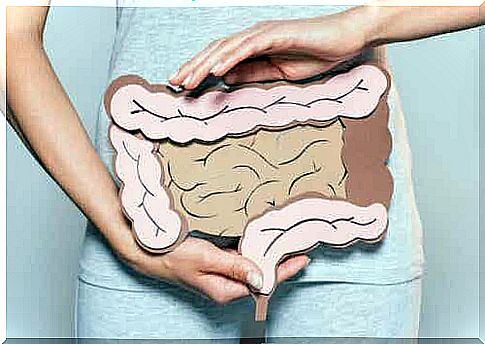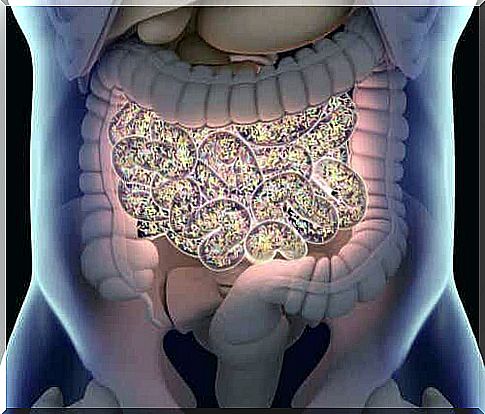Characteristics And Causes Of Leaky Gut

Do you often use ultra-processed foods, medicines and other medicines? Be careful as these can cause leaky gut. The symptoms manifest themselves in the skin and stomach, and can cause mental disorders and autoimmune diseases.
Read on to learn more about the causes of leaky gut.
What causes leaky gut?

Although leaky gut is a disease that starts in the digestive tract, it also affects many other systems. This condition occurs when there is damage to the enterocytes or proteins that bind them together. When this happens, the likelihood of some of the contents of the intestinal lumen (inside the intestine) leaking into the bloodstream or lymphatic system increases.
It does not leak large pieces of food, but a combination of many different elements:
- Poorly digested protein
- Bacteria or bacterial fragments
- A variety of toxins or wastes you usually excrete.
You should know that these substances should not cross the intestinal barrier as the body reacts by activating the immune system as a protection against new “invaders”. The response is such that the body can make mistakes and even attack its own cells if this takes place over a long period of time.
Several studies have shown how these autoimmune attacks play a role in the development of diseases such as Hashimoto’s thyroiditis or type 1 diabetes. This excessive activation of the immune system leads to inflammation throughout the body. This inflammation affects not only the intestine itself, but also other organs and tissues, such as the skeletal system, kidneys, pancreas, liver and brain.
If you suffer from leaky gut, you will not necessarily only suffer from symptoms in the gut, it can also manifest itself as:
- Migraine
- Dysmenorrhea
- Skin problems such as eczema and psoriasis
- Psychological disorders such as depression
- Autoimmune diseases affecting the thyroid gland or joints
Factors that cause leaky gut
The following can induce leaky gut:
- A diet based on industrial products
- Wheat can trigger certain autoimmune diseases
- Factors that affect the regeneration of the epithelium, such as stress or hormonal imbalance
- Medicines that destroy the microbiota or affect the integrity of the epithelium, such as antibiotics, non-steroidal anti-inflammatory drugs and antacids
How to restore intestinal permeability?

1. Avoid anything that causes inflammation in the gut
This means that one should avoid:
- A diet rich in ultra-processed foods, refined carbohydrates, simple sugars and industrial pastries.
- Medications such as antibiotics and anti-inflammatory drugs
- A diet with little fermentable fiber
- Toxins in the diet, such as wheat seed oils
- Chronic stress
2. Take care of the intestinal microbiota
The human gut contains as many bacteria as there are cells throughout the body. With more than 400 different species of bacteria, we have only just begun to understand the role of the microbiota in our health. Among other things, it promotes normal gastrointestinal function, offers protection against infections, regulates metabolism and strengthens the immune system.
To take care of the intestinal microbiota you should:
- Eliminate foods rich in toxins from your diet
- Maximize your digestive capacity by eating when you are hungry and leave a space between meals so that the gastric juices work as normal
- Eat fermentable fiber such as resistant starch, pectins and fructans
- Eat fermented foods such as yogurt, kefir, sauerkraut, kimchi and other high quality probiotics
- Treat the presence of intestinal pathogens as parasites
3. Regulating the acidity of the stomach helps to control leaky gut
Stomach acid is a basic requirement for a healthy digestion. The breakdown and absorption of nutrients takes place at an optimal rate within a narrow range of acidity. The normal chemical reactions required to absorb nutrients suffer if there is not enough stomach acid.
Low stomach acid also impairs the digestion of carbohydrates, so if the pH level in the stomach is too high, the enzymes in the pancreas will not be secreted, and carbohydrates will not be broken down properly.
Furthermore, these undigested carbohydrates lead to bacterial overgrowth in the small intestine. It can also lead to increased gas production and discomfort during digestion.
Remember this about intestinal health
Leaky gut has various causes, but many are linked to an unhealthy lifestyle. You have therefore taken a big step to improve your intestinal health if you improve your diet, avoid toxins and control stress.
Talk to a nutritionist if you are in doubt about what you are eating or if you want to adopt a healthier diet. They will advise you on what is best for your intestines and for your diet in general.









